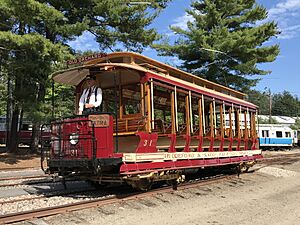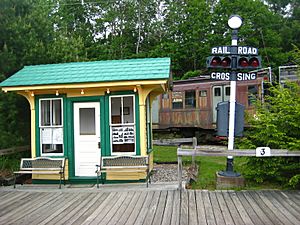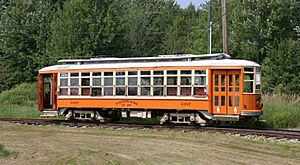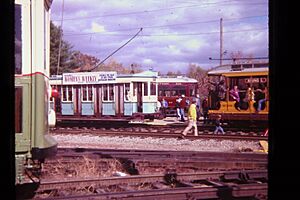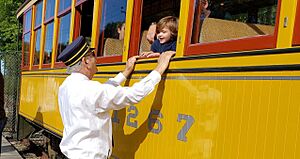Seashore Trolley Museum facts for kids
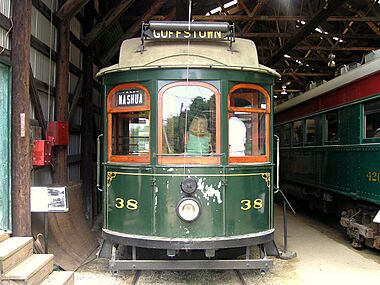
Manchester Street Railway 38 is a Laconia built car preserved at the Seashore Trolley Museum
|
|
| Established | 1939 |
|---|---|
| Historian | Richmond Bates |
| Owner | New England Electric Railway Historical Society |
The Seashore Trolley Museum in Kennebunkport, Maine, USA, is a special place. It's the world's first and largest museum dedicated to public transportation vehicles. While it's famous for its trolley cars, also known as trams, it has much more! You can see rapid transit trains, Interurban cars, trolley buses, and even motor buses.
The New England Electric Railway Historical Society (NEERHS) owns and runs the museum. Out of over 350 vehicles, ten trolleys and railroad cars from Maine were added to the National Register of Historic Places in 1980. These are known as Maine Trolley Cars. The museum also has the biggest model railroad layout in Maine, housed in its own building.
Contents
How the Museum Started
The Seashore Trolley Museum began in 1939. Two of its founders were Theodore F. Santarelli de Brasch and Osmond Richard Cummings. Santarelli led the museum until 1987, and Cummings was a historian of New England railroads.
The idea for the museum came about when a group of railfans (people who love trains and trolleys) heard some news. The Biddeford and Saco Railroad was buying motor buses to replace its trolley cars. Many trolley companies were doing this because buses had become more reliable and cheaper to run.
Saving the First Trolley
The railfans wanted to save a trolley for the future. The railroad agreed to sell them a car, number 31, for $150. This was a 12-bench open trolley. However, they had to move it because local rules didn't allow old trolleys to be used as houses. The railfans didn't plan to live in it, but they still had to move it.
They rented some farmland on Log Cabin Road in Kennebunkport. This land was next to the old tracks of the Atlantic Shore Line Railway. So, trolley 31 was moved to its new home.
Around the same time, another group of railfans bought a trolley from the Manchester and Nashua Street Railway. The two groups joined forces, and the Nashua trolley was also brought to the Log Cabin Road site. In 1941, the founders officially formed the New England Electric Railway Historical Society.
Growth After the War
World War II put the museum's plans on hold. Many members joined the armed forces. The war also caused trolleys to be used more in cities for a while. This was because gas and rubber were rationed for the war effort.
After the war, trolley lines continued to switch to buses. This was a time of fast growth for the museum's collection.
In the 1950s, a diesel-powered generator was used to make the cars move on their own. Car 31 was moved into a small building for repairs. The museum grew bigger in 1955 and 1956. The Society bought land near the Biddeford city line. In the summer of 1956, the Seashore Electric Railway started carrying passengers on weekends. Its track was about 1/4 mile long.
In 1980, ten of the museum's trolley and railroad cars were listed on the National Register of Historic Places. These included trolley #31 and other vehicles that were built or used in Maine.
By 2010, the museum had over 260 vehicles. Most are from New England and other parts of the United States. But there are also trolleys from Canada, Australia, Japan, Germany, Hungary, England, Scotland, Italy, and other countries. The museum even has Biddeford and Saco bus #31. This was the bus that replaced trolley #31 in 1939. The bus company later gave it to the museum. The Seashore Trolley Museum still adds new vehicles to its collection.
What You Can See and Do
The main building at the museum is the Visitors Center. Here you can buy tickets and visit the museum store.
Restored trolleys are displayed in three car barns. There's also a restoration shop with a viewing area. This lets visitors see how the vehicles are fixed and kept in good condition. Other storage barns hold vehicles waiting to be restored. These areas are not open to the public.
Riding the Trolleys
You can ride the restored trolleys on the museum's special railway. This railway follows the path of the old Atlantic Shore Line Railway. That trolley line used to connect Kennebunkport to York Beach. Museum volunteers rebuilt about 1 1/2 miles of track from scratch. The museum owns the right of way all the way to Biddeford, which is about 5 miles from the Visitor Center. The demonstration ride takes you 1 1/2 miles to Talbott Park, where the trolleys turn around, and then back to the Visitor Center.
The museum also has a collection of trolley buses. About twenty of these are in working order. Workers are always restoring six or seven cars at a time.
Fun Events
The museum hosts many themed events during its operating season, from May to December. These include the Pumpkin Patch Trolley and special holiday rides in November and December. They also have free children's story time. You can even rent the exhibit room for parties or family get-togethers.
A new building for the museum's model railroad layout opened in May 2024. It started operating year-round in early 2025. This model railroad is in HO scale and is based on the Maine Central Railroad. A couple from Jonesport, Maine donated the original layout to the museum in 2020.
See also
- Boston Street Railway Association
- Heritage railway
- List of heritage railways
- National Register of Historic Places listings in York County, Maine
- Shore Line Trolley Museum
- State of the Art Car
 | Delilah Pierce |
 | Gordon Parks |
 | Augusta Savage |
 | Charles Ethan Porter |


